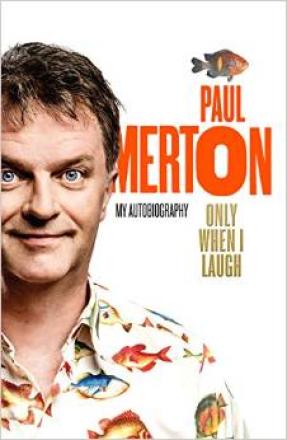
The trouble with autobiographies of stand-up comedians is that if you are a big enough fan to shell out for them you are probably going to be familiar with many of the stories in them. This is the case with Paul Merton's eagerly anticipated story. I’ve interviewed him a few times and felt a keen sense of deja vu while reading his book. Followers of his work and career may well feel the sme.
Having said that the advantage of being a fan is that one can read the story in the subject's voice and it is this which brings Merton's account of his life to life. You can almost see him sitting at the foot of your bed with the book in his hand as he recalls his early gigs and his famous policeman-on-acid breakthrough routine.
Unlike Omid Djalili's recent book, where you'd be hard-pressed to know that he had a stand-up career before he became a renaissance man, there is plenty about the good and bad gigs at long-forgotten 1980s clubs. There is even a lot about the journeys to and from gigs – a train journey chat about TV trivia with Mark Miwurdz is very nicely recalled.
There is the advantage here over press interviews that this is a first person account of events, not one told via journalists who want a sensational angle. So Merton’s divorce from his first wife Caroline Quentin and the death of his second wife Sarah Parkinson from cancer are both treated with dignity and respect.
Merton comes from the first post-alternative comedy wave, who were inspired by the likes of Alexei Sayle and started out at the Comedy Store in the early 1980s. He writes evocatively of his childhood obsession with comedy – particularly silent comedy - and how if the Comedy Store hadn’t been around he may never have got his break – he was not from Oxbridge so there was no Footlights Society or Oxford Revue to give him a leg up. He did, however, send scripts to the BBC with his chum John Irwin, so maybe he would have broken through eventually as a writer. We can never know.
The narrative is pretty conventional, as we go from stand-up struggles to TV success, from working class lad to Radio 4 regular. It is hard to believe he was once turned down by R4 and concluded it was because of his accent. All the major events are well-dealt with, from his Kafkaesque time in the Maudsley Psychiatric Hospital to Angus Deayton having to leave Have I Got News For You when he became the subject of scandal himself. There is an amusing story from this period that I didn’t know about when Merton was told he was the subject of a tabloid drugs scandal and was terrified despite its falsehood – until he found out it was a mistake and it was actually footballer Paul Merson in the papers.
The story goes deeper than newspaper interviews in places but it does also succumb to its own cliches. His father was the classic distant dad, but when he died a cupboard filled with cuttings of his son’s achievements was found. I guess you can hardly leave a personal detail like that out though. The editing could also be tighter. He makes the common – and understandable – mistake of mis-remembering that Monty Python first went out on BBC2 (it was actually BBC1). And on page 302 Merton refers to the BBC’s "legendary props master" Bobby Warrens. Not legendary enough to spell his name correctly – it is Bobby Warans.
But these are minor cavils. Merton’s story will be of interest to anyone who has seen him on television and that must be most of the country. And it is a very funny book. Even if you’ve heard some of the jokes before it does at least gather them all in one place. It is almost worth the cover price alone for the recounting of an anecdote about Glenda Jackson appearing on Have I Got News For You. I won't repeat it here, but if you don't remember it and want to save on the cover price you can google it and find it here. As I said, the problem with the best bits of books like this is that they often aren’t new bits.
Buy Only When I Laugh here.


